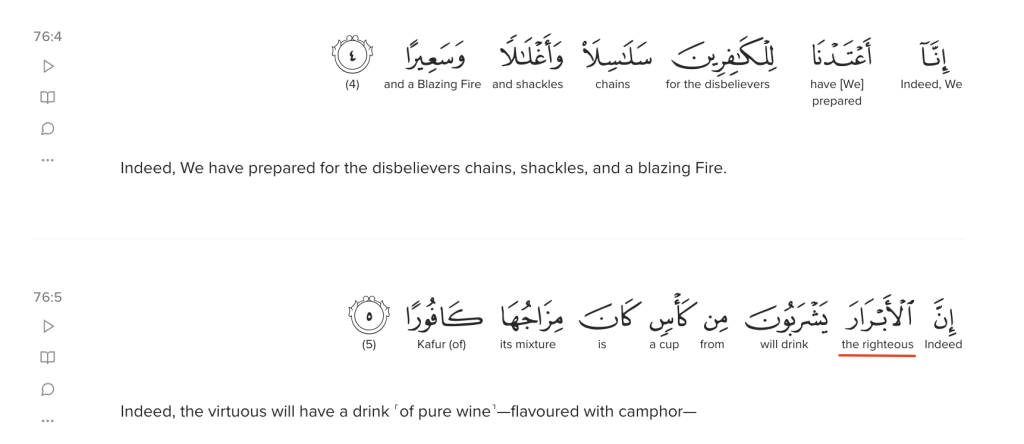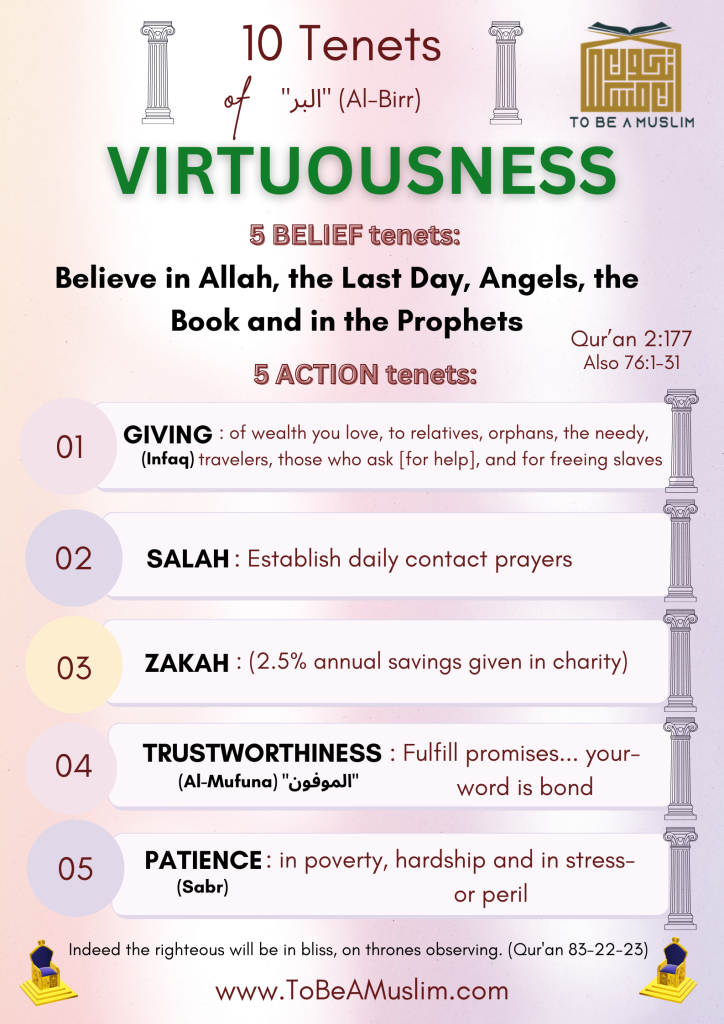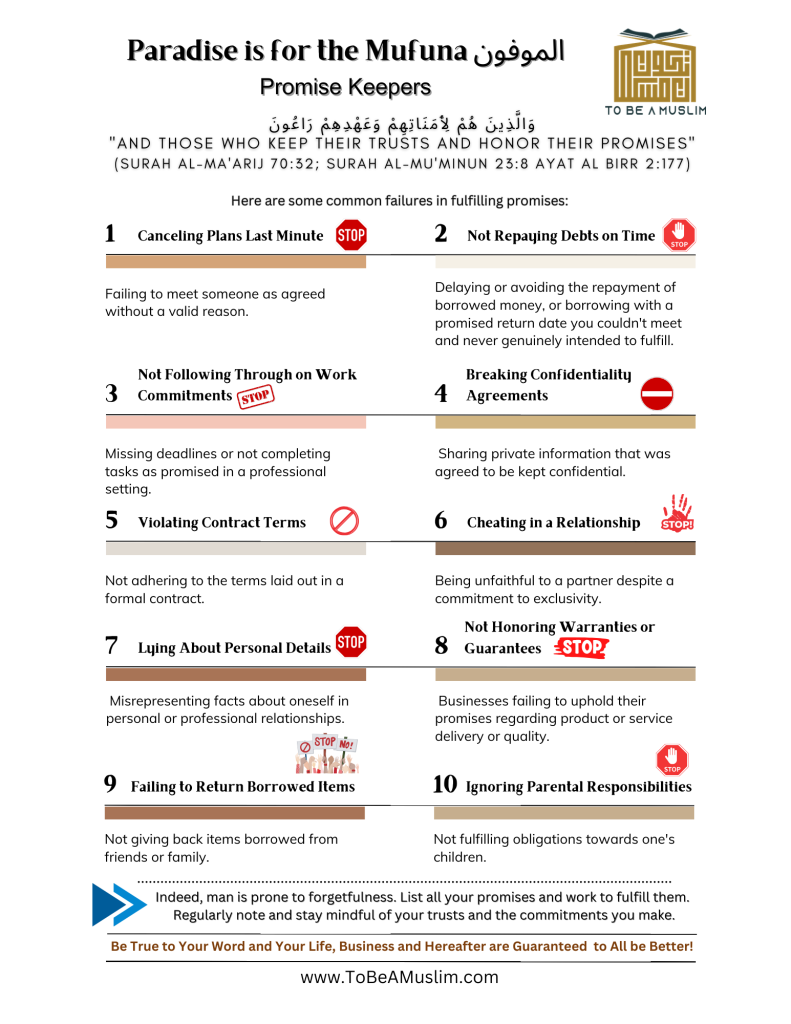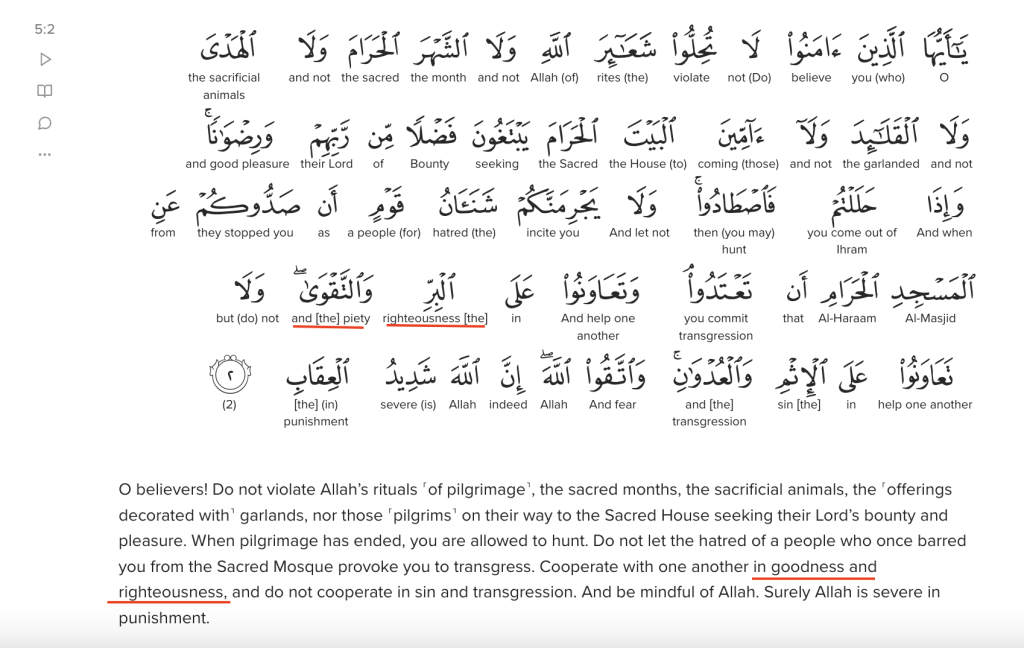Birr – Virtuousness and Taqwa – God-Consciousness
“Help one another in Al-Birr and At-Taqwa”
Al-Ma’idah 5:2
Birr and Taqwa together present a holistic Islamic way of life. Birr focuses on belief cores, outward actions and social responsibilities, while Taqwa emphasizes inner mindfulness of Allah سُبْحَٰنَهُۥ وَتَعَٰلَىٰ, the foundational God-consciousness at the root of all abstinence and virtue. Both concepts are essential for a Muslim’s spiritual growth, moral excellence and purification of heart for a good life and eternal reward.
Birr (Virtuousness/Righteous deeds)
Birr in Islam encompasses comprehensive righteousness or virtuousness, combining religious duties and ethical conduct. In one Narration, the Prophet ﷺ is reported to have said, البر حسن الخلق. ‘Birr’ is good character. Imam Nawawi (rahimahullah) explains under the commentary of this Hadith that ‘birr’ means kinship, kindness, acts of charity, good social etiquette, obedience. He then states that all of the above meanings make up good character.
Allah سُبْحَٰنَهُۥ وَتَعَٰلَىٰ is Al-Barr, the Source of all goodness, the Beneficent, Doer of all good, the Pure [Qur’an 52:28].
The person who is pious is called ‘barr’ in Arabic, plural is ‘abrar’, referring to those who do pious deeds and they have a very high place in heaven.

Key Aspects of Birr:
- Belief:
- Faith in Allah (swt), the Day of Judgment, belief in the prophets, the Glorious Book and belief in Angels.
- Reference: Surah Al-Baqarah (2:177)
- Charitable Deeds:
- Giving to relatives, orphans, the needy, those who ask [for help], travelers, and freeing slaves.
- Giving the annual Zakah – saved wealth purification.
- Reference: Surah Al-Baqarah (2:177)
- Moral Conduct:
- Maintaining prayer, keeping promises and having patience.
- Reference: Surah Al-Baqarah (2:177)
لَنْ تَنَالُوا الْبِرَّ حَتَّىٰ تُنْفِقُوا مِمَّا تُحِبُّونَ ۚ وَمَا تُنْفِقُوا مِنْ شَيْءٍ فَإِنَّ اللَّهَ بِهِ عَلِيمٌ
By no means shall you attain to righteousness until you spend (benevolently) out of what you love; and whatever thing you spend, Allah surely knows it.
Qur’an, 3:92
Birr in the Bible:
Religion that God our Father accepts as pure and faultless is this: to look after orphans and widows in their distress and to keep oneself from being polluted by the world.
James 1:27
Ayatul Birr
It is important to note that verse 2:177 links Al-Birr to three other key concepts in the Quran and Islam namely, Iman (Belief), Sidq (Sincerity) and Taqwa (God-consciousness). Not to mention also, other key terms and concepts within them like they believe in Allah, The Last Day, Malaikah (Angels), Al-Kitab (the Book), The Prophets, and their actions: Sadakah (charity), Salah (contact prayers), Zakah (annual savings purification charity), Muuna/Mufi (keeping to promises), and Sabr (patience).
The Birr Surah: Chapter 76 – Insan
Chapter 76 of the Qur’an in entirety basically speaks of the Abrar, describing all five of the major righteous deed features of them – (1&2) their willful feeding in-spite of love (for the food/wealth), of the orphans, the captives and the needy (Charity and Zakah) – only to see the face of their Lord and not for any earthly gratitude; (3) their Mufuna trait – keeping their word, (4) their patience and their fear of the day of judgment, while extolling patience and encouraging (5) Salah – worship in the day and long hours of the night. The chapter promises a beautiful reward for the Abrar. The Prophet (PBUH) is reported to have recited this key Birr chapter along with surah Sajdah (32) every Friday morning.

Anas Zubedy says of birr, “I believe that the application of Birr at the individual, family, community, national and global level which have the possibility to cure many of the problems of humanity. For example, in ‘expending wealth, no matter how much we may love them’ to the six categories of people mentioned, could be the core and fundamental policy for economics and social development that can eradicate poverty, human trafficking and modern-day slavery.”


Taqwa (Mindfulness of God/Piety)
Taqwa involves developing a conscious awareness of Allah سُبْحَٰنَهُۥ وَتَعَٰلَىٰ, influencing a believer’s life choices and actions. The word “Taqwã” is derived from the verb waqã, which literally means to preserve, protect, safeguard, shield, etc.
Key Elements of Taqwa can be obtained from the Glorious Qur’an:
- Fasting:
- Fasting is prescribed as a means to cultivate Taqwa.
- Reference: Surah Al-Baqarah (2:183)
- Fulfilling Obligations to Others:
- Providing for divorced women, a duty that signifies Taqwa.
- Reference: Surah Al-Baqarah (2:241)
- Ethical Wills and Bequests:
- The practice of making ethical wills and bequests is an aspect of Taqwa.
- Reference: Surah Al-Baqarah (2:180)
- Reverence for Sacred Symbols:
- Honoring the sacred symbols of Allah is a sign of Taqwa.
- Reference: Surah Al-Hajj (22:32)
- Avoidance of Slander and Suspicion:
- Refraining from slander and suspicion aligns with the principles of Taqwa.
- Reference: Surah Al-Hujurat (49:12)
- Spiritual Resilience in Adversity:
- Those with Taqwa display resilience against evil thoughts and temptations in times of adversity.
- Reference: Surah Al-A’raf (7:201)
- Ethical Living:
- Adherence to Islamic ethics in personal and social life.
- Reference: Surah Al-Imran (3:102)
These are some of the examples of behaviors related to Taqwa in the Qur’an. A Muslim must have Taqwa and adhere to the tenets of birr to be successful. Muslims are advised to encourage each other in these two concepts:

Shaykh ibn al-’Uthaymeen, may Allah have mercy on him, says of these two key terms:
Definition of Taqwa and the difference between Taqwa and Birr
The shaykh mentions these points of benefit in his explanation of “Riyaadus Saaliheen” under the chapter of Taqwa. He says:
Taqwa is taken from the word “shield” and it is something mankind takes to protect himself from the punishment of Allah. Mankind will be protected from Allah’s punishment by:
Acting upon His commandments.
Staying away from His prohibitions.
And know that sometimes Taqwa is connected with the word Birr. So it is said, “Birr and Taqwa” just as it is found in Allah’s statement:
وَتَعَاوَنُواْ عَلَى ٱلۡبِرِّ وَٱلتَّقۡوَىٰۖ
“Help you one another upon Birr and Taqwa” [Surah Maaidah: 2]
Therefore, if Taqwa is connected to Birr in a sentence then:
Birr takes the meaning of acting upon His commandments and Taqwa takes the meaning of staying away from His prohibitions. And if these words are mentioned by themselves then they encompass both meanings.



